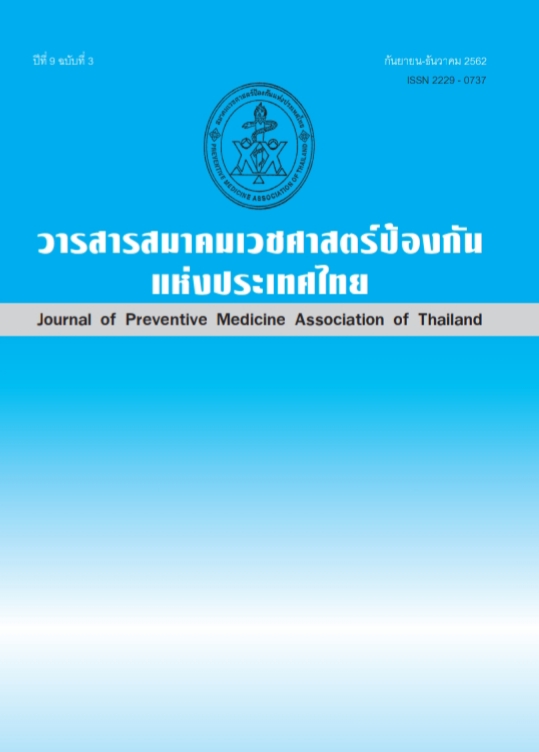Effect of Mozart Music for Capability Memory in Elderly
Keywords:
Mozart music, Elderly, MemoryAbstract
The purposes of this study were quasi-experimental one-group pretest-posttest research was to the ability of memory in elderly persons. Participants were 29 elderly persons who were the age of 60 years and over. There were recruited by using the purposive sampling from the participant who met inclusion criteria. The instruments consisted of demographic data questionnaire 2.The memory assessment 3.The MMSE Thai 2002 4.The Mozart music. These instruments were examined for content validity by musician, psychiatric and aging experts. Data were analyzed using descriptive statistics and pair t-test. Major findings were as followed: 1.The memory ability of elderly persons after listening to Mozart music was significantly higher than that before using Mozart music at p .01
References
2. บุษกร บิณฑสันต์. ดนตรีบำบัด. กรุงเทพฯ: สำนักพิมพ์แห่งจุฬาลงกรณ์มหาวิทยาลัย; 2553.
3. Brewer JF. Healing sounds. Complement. Ther Nurs Midwifery 1998; 4:7-12.
4. Jäncke L. Music, memory and emotion. J Biol. 2008;7:21.
5. สำนักงานกองทุนสนับสนุนระบบสุขภาพแห่งชาติ. ดนตรีเสียงแห่งความสุข เสริมพัฒนาการรอบด้าน [อินเทอร์เน็ต]. 2559 [เข้าถึงเมื่อ 15 ส.ค. 2562]. เข้าถึงได้จาก:https://www.thaihealth.or.th/Content/33270-
6. อริยะ สุพรรณเภษัช. พัฒนา I.Q. E.Q. M.Q. และสมาธิด้วยพลังคลื่นเสียง. กรุงเทพฯ: มหาจุฬาลงกรณ์ราชวิทยาลัย; 2545.
7. Pauwels EK, Volterrani D, Mariani G, Kostkiewics M. Mozart, music and medicine. Med Princ Pract 2014;23:403-12.
8. Darragh B, Randy C. The effect of music genre on a memory task. Modern Psychological Studies 2012;17:87-90.
9. วันชนะ ท่อชู. ผลของดนตรีบำบัดต่อภาวะซึมเศร้าในผู้สูงอายุในศูนย์พัฒนาการจัดสวัสดิการสังคมผู้สูงอายุบ้านบุรีรัมย์ จังหวัดบุรีรัมย์ : การศึกษาเปรียบเทียบดนตรีบ?ำบัดแบบพุทธกับแบบนิวเอจ [วิทยานิพนธ์วิทยาศาสตรมหาบัณฑิต]. ขอนแก่น: มหาวิทยาลัยขอนแก่น; 2549.
10. สุภลักษณ์ มีชูทรัพย์, วัฒนา พันธุ์ศักดิ์. สำรวจความคิดเห็นของผู้สูงอายุที่มีต่อดนตรีกับชีวิต. กรุงเทพฯ: เท็กซ์ แอนด์ เจอร์นัล พับลิเคชั่น; 2538.
11. Särkämö T, Tervaniemi M, Laitinen S, Numminen A, Kurki M, Johnson JK, et al. Cognitive, emotional and social benefits of regular musical activities in early dementia: randomized controlled study. Gerontologist 2014;54:634-50.
12. Moreira SV, Justi, FRDR., Moreira, M. Can musical intervention improve memory in Alzheimer’s patients? Evidence from a systematic review. Dement Neuropsychol 2018;12:133-42.
13. ภาควิชาจิตเวชศาสตร์คณะแพทยศาสตร์โรงพยาบาลรามาธิบดี มหาวิทยาลัยมหิดล. ภาวะสมองเสื่อม [อินเทอร์เน็ต]. 2557 [เข้าถึงเมื่อ 25 ก.ย. 2562]. เข้าถึงได้จาก: https://med.mahidol.ac.th/ramamental/generalknowledge/07072014-1302.
14. Blackburn R, Bradshaw T. Music therapy for service users with dementia: A critical review of the literature. J Psychiatri Ment Health Nurs 2014;21:879-88.
15. วิลาวัณย์ ไชยวงศ์. ประสิทธิผลของโปรแกรมฝึกความจำสำหรับผู้สูงอายุ. [วิทยานิพนธ์พยาบาลศาสตรมหาบัณฑิต]. เชียงใหม่: มหาวิทยาลัยเชียงใหม่; 2548.
16. คณะกรรมการจัดทำแบบทดสอบสภาพสมองเบื้องต้น ฉบับภาษาไทย พ.ศ. 2542. แบบทดสอบสภาพสมองเบื้องต้น ฉบับภาษาไทย MMSE-Thai 2002. กรุงเทพฯ: สภาบันเวชศาสตร์ผู้สูงอายุ กรมการแพทย์ กระทรวงสาธารณสุข; 2545.
17. อนุวัตร ลิ้มสุวรรณ. ดนตรีรักษาโรคทางสมอง. พิมพ์ครั้งที่ 3. กรุงเทพฯ:ชุมนุมสหกรณ์การเกษตรแห่งประเทศไทย; 2542.
18. บทความสุขภาพ: ดนตรีบำบัดโรค [อินเทอร์เน็ต]. 2562 [เข้าถึงเมื่อ 16 ก.ย.2562]. เข้าถึงได้ จาก: http://www.todayhealth.org/daily-health/บทความสุขภาพ/ดนตรีบำบัดโรค-ตอนที่-2.html
19. เพราะเหตุใดดนตรีจึงกระตุ้นความทรงจำของผู้ป่วยอัลไซเมอร์ [อินเทอร์เน็ต] 2562. [เข้าถึงเมื่อ 23 ก.ค.2562] เข้าถึงได้จาก:https://www.posttoday.com/life/healthy/599382
Downloads
Published
How to Cite
Issue
Section
License
บทความที่ลงพิมพ์ในวารสารเวชศาสตร์ป้องกันแห่งประเทศไทย ถือเป็นผลงานวิชาการ งานวิจัย วิเคราะห์ วิจารณ์ เป็นความเห็นส่วนตัวของผู้นิพนธ์ กองบรรณาธิการไม่จำเป็นต้องเห็นด้วยเสมอไปและผู้นิพนธ์จะต้องรับผิดชอบต่อบทความของตนเอง






